Deck 7: Section 1: Applications of Integration
Question
Question
Question
Question
Question
Question
Question
Question
Question
Question
Question
Question
Question
Question
Question
Question
Question
Question

Unlock Deck
Sign up to unlock the cards in this deck!
Unlock Deck
Unlock Deck
1/18
Play
Full screen (f)
Deck 7: Section 1: Applications of Integration
1
Find the area of the region bounded by the equations by integrating (i) with respect to x and (ii) with respect to y. 
A)
B)
C)
D)
E)

A)

B)

C)

D)

E)


2
Find the area of the region bounded by the graphs of the algebraic functions. 
A)
B)
C)
D)
E)

A)

B)

C)

D)

E)


3
Find the area of the region bounded by the graphs of the algebraic functions. 
A)
B)
C)
D)
E)

A)

B)

C)

D)

E)


4
Find the area of the region bounded by the graphs of the algebraic functions. 
A)
B)
C)
D)
E)

A)

B)

C)

D)

E)


Unlock Deck
Unlock for access to all 18 flashcards in this deck.
Unlock Deck
k this deck
5
Concrete sections for the new building have the dimensions (in meters) and shape as shown in the figure (the picture is not necessarily drawn to scale). One cubic meter of concrete weighs 4320 pounds. Find the weight of the section. Round your answer to the nearest pound. 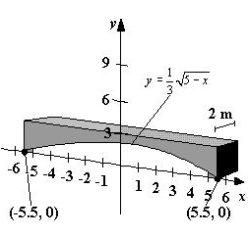
A) 268,492 pounds
B) 263,654 pounds
C) 216,267 pounds
D) 242,187 pounds
E) 251,865 pounds

A) 268,492 pounds
B) 263,654 pounds
C) 216,267 pounds
D) 242,187 pounds
E) 251,865 pounds

Unlock Deck
Unlock for access to all 18 flashcards in this deck.
Unlock Deck
k this deck
6
Concrete sections for the new building have the dimensions (in meters) and shape as shown in the figure (the picture is not necessarily drawn to scale). Find the area of the face of the section superimposed on the rectangular coordinate system. Round your answer to three decimal places. 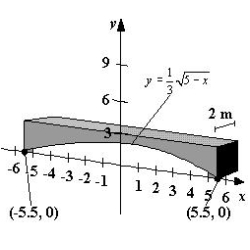
A) 25.031
B) 31.075
C) 29.151
D) 30.515
E) 28.031

A) 25.031

B) 31.075

C) 29.151

D) 30.515

E) 28.031


Unlock Deck
Unlock for access to all 18 flashcards in this deck.
Unlock Deck
k this deck
7
The integrand of the definite integral is a difference of two functions. Sketch the graph of each function and shade the region whose area is represented by the integral  .
.
A)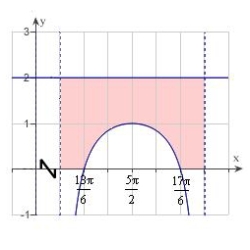
B)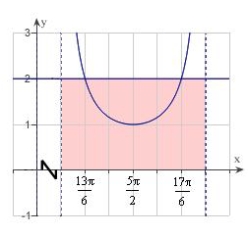
C)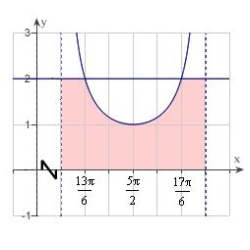
D)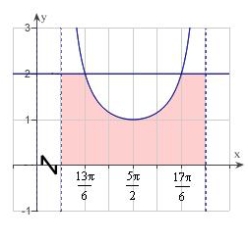
E)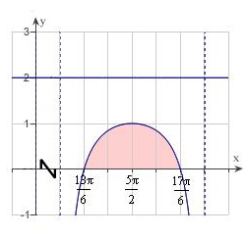
 .
.A)

B)

C)

D)

E)


Unlock Deck
Unlock for access to all 18 flashcards in this deck.
Unlock Deck
k this deck
8
If the accumulation function  is given by
is given by  , evaluate
, evaluate 
A)
B)
C)
D)
E)
 is given by
is given by  , evaluate
, evaluate 
A)

B)

C)

D)

E)


Unlock Deck
Unlock for access to all 18 flashcards in this deck.
Unlock Deck
k this deck
9
Find the area of the region bounded by the graphs of the algebraic functions. 
A)
B)
C)
D)
E)

A)

B)

C)

D)

E)


Unlock Deck
Unlock for access to all 18 flashcards in this deck.
Unlock Deck
k this deck
10
The chief financial officer of a company reports that profits for the past fiscal year were $  million. The officer predicts that profits for the next 7 years will grow at a continuous annual rate somewhere between
million. The officer predicts that profits for the next 7 years will grow at a continuous annual rate somewhere between  % and 6%. Estimate the cumulative difference in total profit over the 7 years based on the predicted range of growth rates. Round your answer to three decimal places.
% and 6%. Estimate the cumulative difference in total profit over the 7 years based on the predicted range of growth rates. Round your answer to three decimal places.
A) $445.736 billion
B) $30.221 billion
C) $7.023 billion
D) $18.710 billion
E) $57.880 billion
 million. The officer predicts that profits for the next 7 years will grow at a continuous annual rate somewhere between
million. The officer predicts that profits for the next 7 years will grow at a continuous annual rate somewhere between  % and 6%. Estimate the cumulative difference in total profit over the 7 years based on the predicted range of growth rates. Round your answer to three decimal places.
% and 6%. Estimate the cumulative difference in total profit over the 7 years based on the predicted range of growth rates. Round your answer to three decimal places.A) $445.736 billion
B) $30.221 billion
C) $7.023 billion
D) $18.710 billion
E) $57.880 billion

Unlock Deck
Unlock for access to all 18 flashcards in this deck.
Unlock Deck
k this deck
11
The surface of a machine part is the region between the graphs of  and
and  as shown in the figure. Find the area of the surface of the machine part. Round your answer to five decimal places.
as shown in the figure. Find the area of the surface of the machine part. Round your answer to five decimal places. 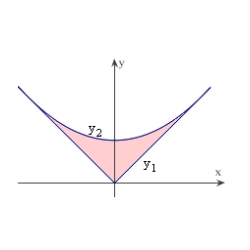
A) 1.66667
B) 0.41667
C) 0.01333
D) 33.33333
E) 8.33333
 and
and  as shown in the figure. Find the area of the surface of the machine part. Round your answer to five decimal places.
as shown in the figure. Find the area of the surface of the machine part. Round your answer to five decimal places. 
A) 1.66667
B) 0.41667
C) 0.01333
D) 33.33333
E) 8.33333

Unlock Deck
Unlock for access to all 18 flashcards in this deck.
Unlock Deck
k this deck
12
Find the area of the region bounded by the graphs of the equations.  .
.
A)
B)
C)
D)
E)
 .
.A)

B)

C)

D)

E)


Unlock Deck
Unlock for access to all 18 flashcards in this deck.
Unlock Deck
k this deck
13
The surface of a machine part is the region between the graphs of  and
and  as shown in the figure. Find k if the parabola is tangent to the graph of
as shown in the figure. Find k if the parabola is tangent to the graph of  . Round your answer to three decimal places.
. Round your answer to three decimal places. 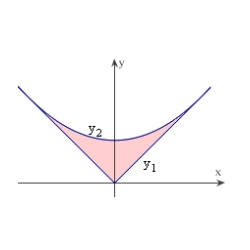
A) 3.125
B) 0.160
C) 0.080
D) 0.320
E) 6.250
 and
and  as shown in the figure. Find k if the parabola is tangent to the graph of
as shown in the figure. Find k if the parabola is tangent to the graph of  . Round your answer to three decimal places.
. Round your answer to three decimal places. 
A) 3.125
B) 0.160
C) 0.080
D) 0.320
E) 6.250

Unlock Deck
Unlock for access to all 18 flashcards in this deck.
Unlock Deck
k this deck
14
Suppose that  and
and  model the revenue (in billions of dollars) for a large corporation. The model
model the revenue (in billions of dollars) for a large corporation. The model  gives projected annual revenues from 2008 through 2015, with
gives projected annual revenues from 2008 through 2015, with  corresponding to 2008, and
corresponding to 2008, and  gives projected revenues if there is a decrease in the rate of growth of corporate sales over the period. Approximate the total reduction in revenue if corporate sales are actually closer to the model
gives projected revenues if there is a decrease in the rate of growth of corporate sales over the period. Approximate the total reduction in revenue if corporate sales are actually closer to the model  . Round your answer to three decimal places.
. Round your answer to three decimal places.
A) $3.570 billion
B) $24.990 billion
C) $19.763 billion
D) $29.645 billion
E) $12.495 billion
 and
and  model the revenue (in billions of dollars) for a large corporation. The model
model the revenue (in billions of dollars) for a large corporation. The model  gives projected annual revenues from 2008 through 2015, with
gives projected annual revenues from 2008 through 2015, with  corresponding to 2008, and
corresponding to 2008, and  gives projected revenues if there is a decrease in the rate of growth of corporate sales over the period. Approximate the total reduction in revenue if corporate sales are actually closer to the model
gives projected revenues if there is a decrease in the rate of growth of corporate sales over the period. Approximate the total reduction in revenue if corporate sales are actually closer to the model  . Round your answer to three decimal places.
. Round your answer to three decimal places.A) $3.570 billion
B) $24.990 billion
C) $19.763 billion
D) $29.645 billion
E) $12.495 billion

Unlock Deck
Unlock for access to all 18 flashcards in this deck.
Unlock Deck
k this deck
15
Set up the definite integral that gives the area of the region bounded by the graph of  and
and  .
. 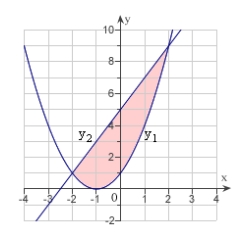
A)
B)
C)
D)
E)
 and
and  .
. 
A)

B)

C)

D)

E)


Unlock Deck
Unlock for access to all 18 flashcards in this deck.
Unlock Deck
k this deck
16
Find the area of the region bounded by equations by integrating (i) with respect to x and (ii) with respect to y. 
A)
B)
C)
D)
E)

A)

B)

C)

D)

E)


Unlock Deck
Unlock for access to all 18 flashcards in this deck.
Unlock Deck
k this deck
17
Find the area of the region bounded by the graphs of the function 
 . Round your answer to three decimal places.
. Round your answer to three decimal places.
A) 0.260
B) 0.289
C) 0.416
D) 0.139
E) 0.462

 . Round your answer to three decimal places.
. Round your answer to three decimal places.A) 0.260
B) 0.289
C) 0.416
D) 0.139
E) 0.462

Unlock Deck
Unlock for access to all 18 flashcards in this deck.
Unlock Deck
k this deck
18
Find the area of the region bounded by the graphs of the equations. 
A)
B)
C)
D)
E)

A)

B)

C)

D)

E)


Unlock Deck
Unlock for access to all 18 flashcards in this deck.
Unlock Deck
k this deck


